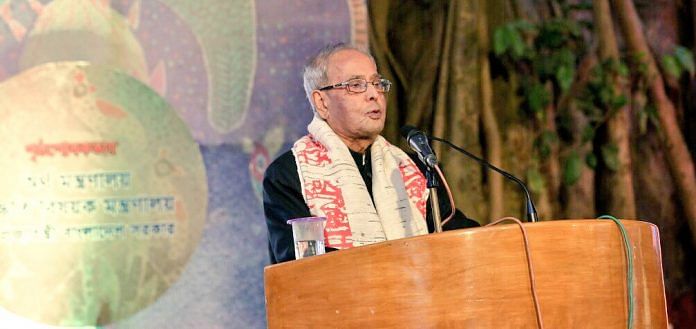In his over five-decade-long career, Pranab Mukherjee has served as a party worker, Parliamentarian, minister and President of India.
New Delhi: Few politicians in the history of modern India have donned as many hats as former President Pranab Mukherjee.
From starting out as a Rajya Sabha member in his early political days in 1969 to later holding different ministerial portfolios like defence, finance, and external affairs, Mukherjee has remained one of the major forces outside of the Gandhi family to have guided the Congress party since the 1990s.
On his 83rd birthday, here’s a look back at the distinguished political career of the Congress stalwart.
Rise and fall
Born on 11 December 1935, in Mirati village in Bengal (now West Bengal), Mukherjee studied history, political science and law at the University of Calcutta.
He started his political career as a Rajya Sabha MP of Bangla Congress, a breakaway Congress faction which, however, soon merged into the Congress party. Under Indira Gandhi’s leadership, Mukherjee started getting appointed as a deputy in various ministries like shipping and industrial development before finally earning his big break as Union finance minister in 1982.
However, his fortunes changed when Rajiv Gandhi became prime minister after Indira’s assassination and dropped Mukherjee from his Cabinet.
Mukherjee recounts that day in his book The Turbulent Years 1980-1996, “I kept waiting for the call. Being dropped from Rajiv’s Cabinet was not even peripherally in my mind. I had heard no rumours… When I learnt of my ouster from the Cabinet, I was shell-shocked and flabbergasted. I could not believe it.”
The tough times continued and, in 1986, he was also dropped from the Congress Working Committee. In Mukherjee’s own words, it “was a blow which hurt even more than being dropped from the Cabinet”.
Furthermore, in the same year, after an interview with Pritish Nandy, then editor of The Illustrated Weekly of India, he was also expelled from the party for six years. Speculating upon the reasons for his expulsion, Mukherjee writes, “He [Rajiv] made mistakes and so did I. He let others influence him and listened to their calumnies against me. I let my frustration overtake my patience.”
Also read: India is not a small nation belonging to a particular group of people: Pranab Mukherjee
Resurrection
Mukherjee returned to the Congress party in 1988 and campaigned for it in the Tripura assembly polls. And when P.V. Narasimha Rao became the prime minister in 1991, Mukherjee was appointed the deputy chairman of Planning Commission. In 1993, after a period of almost 9 years, he was again inducted into the Union Cabinet as minister of commerce. In 1995, he took over as minister of external affairs.
Thereafter, by the time Congress returned to power as part of UPA in 2004, Mukherjee had become such an important figure in the party that when Sonia Gandhi decided not to become PM, Mukherjee’s name emerged as the frontrunner.
Mukherjee acknowledges this in his book The Coalition Years 1995-2012, and says, “The prevalent expectation was that I would be the next choice for prime minister after Sonia Gandhi declined.”
And even though Mukherjee was not selected Prime Minister, his stature was hardly diminished. In his book, he accepts as much when he says, “I was reluctant to join the government, and informed Sonia Gandhi accordingly. She, however, insisted that I should join the government since I would be vital to its functioning, and also be of support to Dr Singh. As it turned out, Dr Singh would talk to me on all important issues and seemed to depend on me.”
For almost the next 8 years till his ascension to India’s Presidency, Mukherjee was the Mr. Dependable of Congress. He switched between important portfolios like defence, external affairs, and finance and was instrumental in initiating some major changes in all these sectors — a few welcome ones and a few not so much.
As defence minister, he was responsible for a considerable increase in the defence budget from previous years; as minister of external affairs, played a crucial role in the signing of Indo-US Civil Nuclear Agreement in 2008; and as finance minister in the UPA II regime, he received criticism from various quarters for introducing retrospective amendments to India’s Income Tax Act.
Also read: Pranab Mukherjee’s address at RSS camp got more eyeballs than IPL matches
A true Parliamentarian and Democrat
Mukherjee deeply believes in the spirit of parliamentary democracy. In his book The Coalition Years, he laments what he calls an introduction of a fourth D — Disruption — to the three essential Ds of effective parliamentary democracy — Debate, Dissent, and Decision.
He writes, “It is unfortunate that the parliamentary time devoted to legislation has been gradually declining. With the heightened complexity of administration, legislation must be preceded by adequate discussion and scrutiny. If not, it will fail to deliver the desired results or meet its objectives.”
He also dislikes the ordinance route which governments often adopt. “I am of the firm belief that the ordinance route should be used only in compelling circumstances and that there should be absolutely no recourse to ordinances on monetary matters,” writes Mukherjee.
His repeated attempts to get himself elected to the Lok Sabha, the court of the people, demonstrate this belief. Even though he unsuccessfully contested elections in 1977 and 1980, he made a successful attempt in 2004 guided by “the principle espoused by Nehru — that any Rajya Sabha member who becomes a minister should get himself elected to the Lok Sabha at the earliest opportunity.”
It is perhaps this democratic instinct to engage which led Mukherjee to accept amid all the criticism an invite to a Rashtriya Swayamsevak Sangh event in June this year. But once there, he didn’t shy away from reminding his hosts the ethos of tolerance and pluralism that are central to India’s democracy.




Rajiv Gandhi would have benefited from Pranabda’s presence in his baba log government.